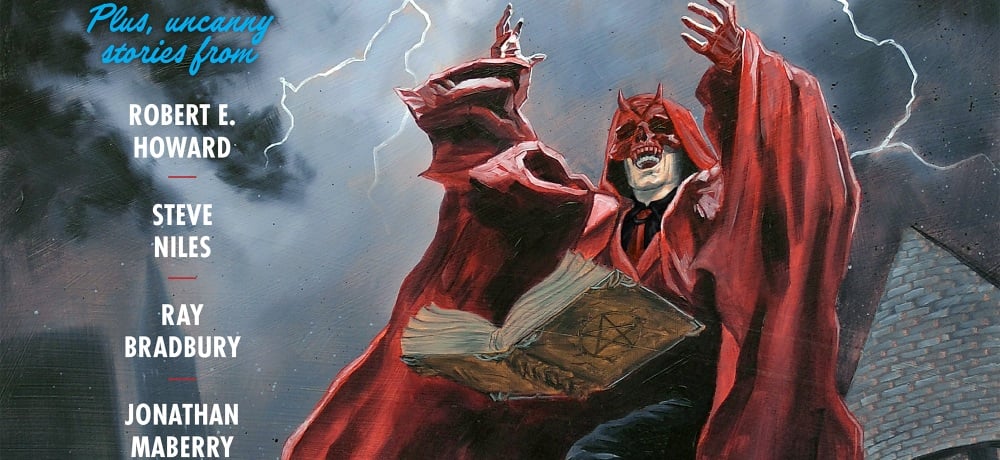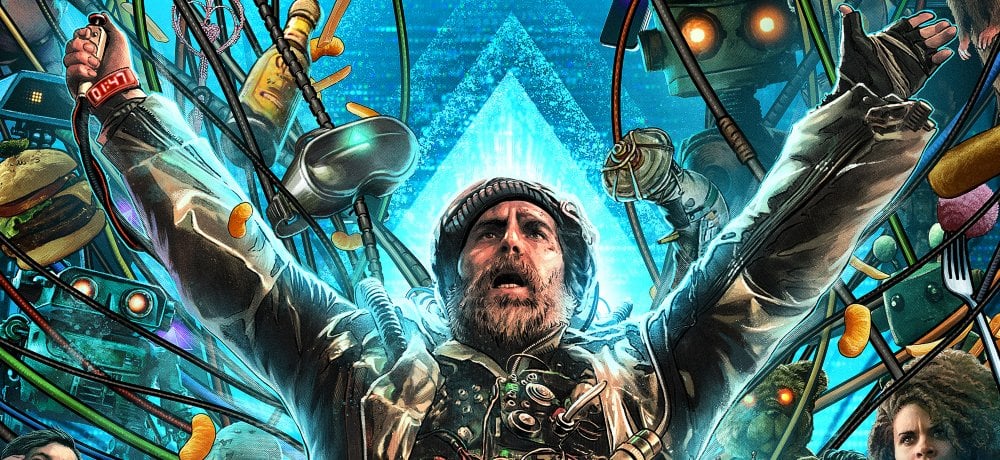





[This Halloween season, we're paying tribute to classic horror cinema by celebrating films released before 1970! Check back on Daily Dead this month for more retrospectives on classic horror films, and visit our online hub to catch up on all of our Halloween 2019 special features!]
“Sometimes one can’t help… imagining things.” Released nearly 60 years ago, Jack Clayton’s The Innocents still remains one of the greatest psychologically charged horror movies ever. Anchored by an all-time performance by Deborah Kerr, whose fragile and frantic governess believes that the children in her care have become possessed by two ill-fated lovers who now utilize the juveniles as a means to continue to not only live on, but experience the joys of childhood once again, The Innocents set the bar for “evil kid” horror in 1961, and its legacy in that regard remains unmatched even now.
Based on playwright William Archibald’s adaptation of Henry James’ The Turn of the Screw, the power of The Innocents lies in its ambiguity and its smothering atmosphere, as it explores the horrors of sexual repression in the Victorian era. The Innocents is also propelled by a palpable sense of paranoia that continues to build until the film’s final fright-filled moments, and its timeless scares still evoke feelings of dread and terror, leaving you speculating at its conclusion about just how much of the mania was self-created by Kerr’s character, or if there were indeed ghosts lurking about at the Bly estate.
If you’ve somehow never watched The Innocents, or are unfamiliar with James’ original story, it follows a young woman named Miss Giddens (Kerr), who takes on a position as a governess for two young children who have been orphaned and now live at their uncle’s (Michael Redgrave) summer estate. His only rules for the young woman is that she is to take complete responsibility for the kids, as he does not want to be bothered by any trivialities when it comes to child-rearing. Giddens is eager to take on the role, and when she declares, “I’ll do everything I can to keep the children happy,” it’s a seemingly innocuous statement, but there’s something slightly desperate about her total commitment to her new charges, and those words take on a life of their own soon enough.
Once she arrives at Bly House, Miss Giddens is completely entranced by both the home and little Flora (Pamela Franklin), who is currently the old child at the homestead, as her brother Miles (Martin Stephens) is away at school. Giddens immediately bonds with the precocious Flora, and falls deeply under her spell, but it is obvious from the start that the power dynamic between the child and her adult caretaker is anything but normal, where you’re left wondering, "Just who exactly is watching who here?" This is especially evident during the scene when Miss Giddens is sleeping and Flora is standing above her, observing the way her new governess tosses and turns while Miss Giddens is out cold, completely unaware.
A short time after settling into her new position, Miles is unexpectedly sent back to Bly after being expelled from his school (a matter his uncle did not want to be troubled by), and his arrival is the beginning of the end for Miss Giddens, so to speak, as he’s even more manipulative than his sister, and there’s a hint of his dangerous nature as well. Even beyond that, Miss Giddens begins to see mysterious figures appearing in various locales on the property, and when she questions the housekeeper, Mrs. Grose (Megs Jenkins), she learns that her predecessor, Miss Jessel (Clytie Jessop), and the house’s valet, Quint (Peter Wyngarde), had been having a lurid affair before their untimely deaths, which prompts Giddens to begin to suspect that these lovers have returned so that they can take over the souls of the children and continue to carry on.
I don’t think it’s a coincidence that every time Miss Giddens sees Quint and Miss Jessel, it just so happens to be connected to the appearance of either Miles and Flora, which is meant to make us question whether or not this might be the governess projecting her own repressive nature onto the kids. That sense of insinuation only elevates the overarching mystery of The Innocents, especially since it is often hard to determine if Miles and Flora are indeed haunted, or if coincidentally enough, they just happen to be creepy as all hell.
After all, early on in The Innocents, Flora asks Miss Giddens about whether or not she’s “good enough” to get into heaven during her nightly prayers, and there is also her matter-of-factness over the dangers of having an imagination, or when she takes just a bit too much delight after finding a spider who is consuming its butterfly prey (an ominous bit of foreshadowing, I must say). And as far as Miles is concerned, not only does he talk like he is a 40-year-old trapped inside of a pre-teen’s body (even by Victorian standards), but he also chokes his governess during a game of Hide and Go Seek, and words like “corrupt” and “contaminate” are often thrown around in regards to Miles whenever Miss Giddens and Mrs. Grose are discussing the status of the children. So yeah, ghosts or no ghosts, the lad is probably bad news.
Beyond that, though, there’s an exchange one night as Miss Giddens is putting Miles to sleep where he asks the woman to kiss him goodnight, and then forcibly plants one on her, right on the lips. It’s easily the raciest moment in The Innocents, and what makes the moment even more obscene is the fact that Giddens does not immediately pull away, with Clayton allowing the camera to linger uncomfortably on the moment. Undoubtedly, it is a scene that was surely shocking back in 1961, and that 10 seconds or so still feels icky to watch nearly 60 years later as well (I mean, that kiss is never going to be anything but grotesquely taboo, so I hope it’s apparent what exactly I’m getting at here).
The heart of The Innocents is Kerr’s Miss Giddens, who we only get a vague backstory about, but there’s enough to understand certain underlying aspects of her character. At the start of the film, we’re told that her father was a religious man, and we can infer that up until this point, she had been living a life of moral rigidity until she arrives at Bly, and with her new position, there’s a sense of power and certain freedoms Miss Giddens now gets to enjoy.
Additionally, the character of Miss Giddens had originally been written as being much younger, but I think the fact that Kerr herself was 40 when she took on the role, when her character was originally intended to be 20 years younger, adds a notable layer of subtext to her character, especially when it comes to her nearly obsessive devotion to both Flora and Miles. There’s a quiet sense of desperation to her actions when it comes to pleasing the kids, where Giddens even breaks the rules in terms of their bedtimes just to score some points with them, as if the duo don’t already have her number.
What’s driving Miss Giddens throughout the second half of The Innocents, when she begins to suspect supernatural forces are at play, is not her intent to destroy the children, but to save them from what she perceives as the looming threats all around—more specifically, the apparitions of both Quint and Miss Jessel, who she believes have returned to pervert the supposedly virtuous Flora and Miles. And whether or not there are actually ghosts running (err, floating) amok in The Innocents, what these deceased characters and their previous sins actually represent are wild perversions that not only threaten Miss Giddens' own chaste nature, but the eventuality of adulthood, which will undoubtedly strip away the innocence of both of these kids.
There’s a sequence in The Innocents that follows Miss Giddens as she’s going through the halls with the locked doors on both sides, and to me, those doors are a representation of these urges that Giddens herself is trying to reconcile and keep buried deep inside of her own increasingly delicate psyche. It’s also interesting that Miss Giddens is the only one who actually sees the ghostly figures in the film, which makes Kerr’s character an unreliable narrator, but in this instance, it works greatly in favor of the story of The Innocents, as her experiences keep viewers off-kilter from start to finish.
On a technical level, The Innocents is an absolute work of art. With Clayton insisting on shooting the film in black and white (a response to the recent wave of brightly colored Hammer films), and 20th Century Fox’s mandate that The Innocents had to be shot in CinemaScope, every single frame of the film could be hung up on a wall in a museum and declared a work of art. The lack of color adds a gloomy bleakness, which not only highlights the gothic nature of the narrative, but also accentuates all the textures of the house and its surroundings. The sound design used throughout The Innocents is incredible, too, with Clayton choosing to eliminate sound whenever Miss Giddens sees either Quint or Miss Jessel, suggesting to us that there’s something very unnatural afoot at Bly House—at least from Giddens’ viewpoint.
Because The Innocents doesn’t offer up any solid answers to viewers by the time its heartbreaking conclusion rolls around, I think that’s why it is a film that has stuck with me for decades now, because there are so many ways to dive into Clayton’s ambiguous masterpiece. It’s a film that warrants a constant rediscovery from genre fans, especially during the Halloween season when you’re in the mood for timeless thrills and chills.
---------
Visit our online hub to catch up on all of our Halloween 2019 special features, including more retrospectives, recipes, and streaming lists!